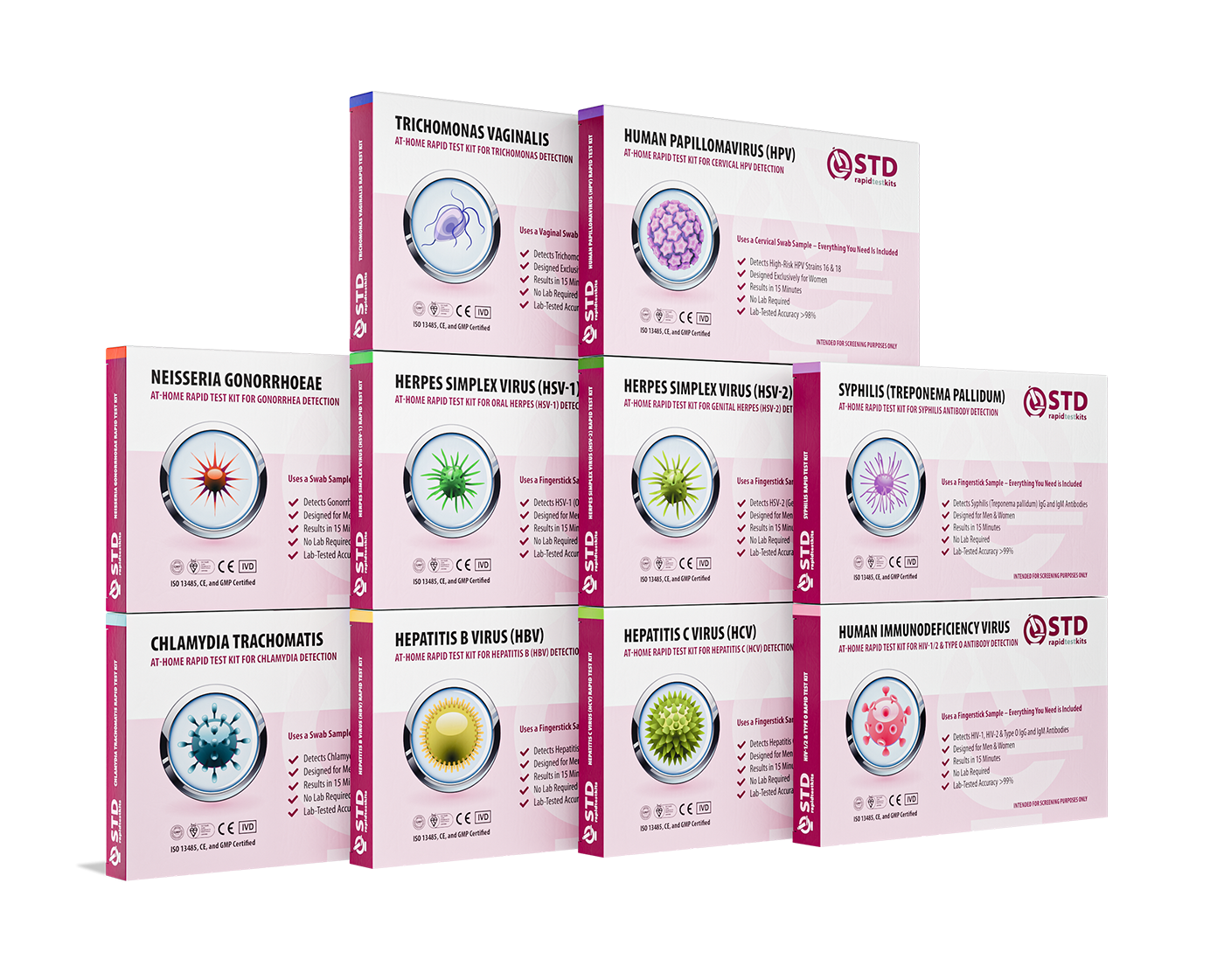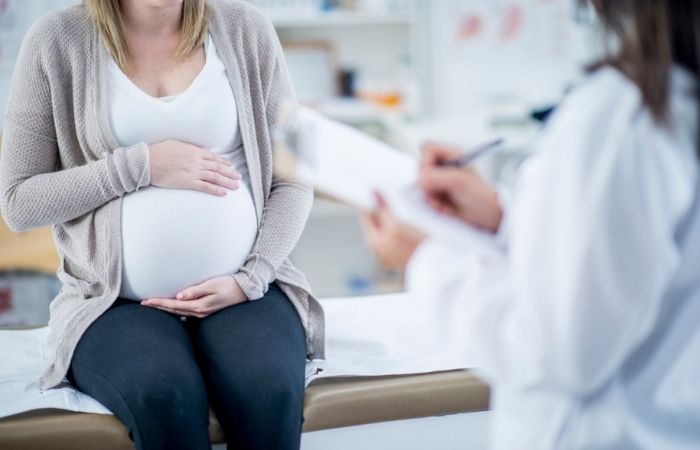There’s a lot happening “down there” when you're pregnant. Extra discharge? Normal. Weird smells? Sometimes. But what about the persistent itch that doesn’t go away? It’s easy to blame hormones, but here’s the truth: vaginal itching, unusual discharge, burning, or sores during pregnancy could be signs of an STD, and they often go unnoticed until it’s too late.
For pregnant women, missing these signs can be risky, not just for you but for your baby. Some STDs can pass to the fetus or cause complications like miscarriage, premature labor, or low birth weight. Let’s break down the gritty truth about symptoms, testing, and how to stay safe without shame.

People are also reading: Syphilis Is Back, And It’s Scarier Than Ever
Why Pregnancy Doesn’t Protect You from STDs
Pregnancy is miraculous, but it doesn’t come with a forcefield. If you’re sexually active during pregnancy, especially with a new or untreated partner, STDs are still on the table. According to the CDC’s 2021 STD Treatment Guidelines, rates of chlamydia, gonorrhea, and syphilis are climbing among pregnant women in the U.S., especially in younger women and communities of color.
In fact, a 2022 JAMA study found that syphilis rates in pregnancy have more than doubled in the past decade, despite routine prenatal testing. Many women never feel a thing until complications strike.
- Risk: You can acquire an STD at any point during pregnancy, not just before conception.
- Myth: Monogamy doesn’t always mean immunity, partners can carry infections without knowing.
- Fact: Many STDs are silent until they cause real harm. Regular screening is your best protection.
Testing early in pregnancy is standard, but retesting later on (especially if you have new symptoms or risks) is just as important. That’s why many OB-GYNs now recommend third-trimester screening for high-risk patients.
Which STDs Cause Itching During Pregnancy?
If you're feeling itchy, irritated, or just “off” down there, don’t write it off as just hormonal. Here's what might be going on:
- Chlamydia: Often symptomless, but can cause burning, abnormal discharge, and pain during urination or sex.
- Trichomoniasis: A common cause of vaginal itching, yellow-green discharge, and a foul smell. Easily confused with a yeast infection.
- Genital Herpes (HSV): Starts with tingling or itching, then progresses to painful blisters or sores. First outbreaks during pregnancy can be severe.
- Gonorrhea: Can cause vaginal irritation, unusual discharge, and spotting. Often overlaps with other STIs.
- HPV or Genital Warts: Can show up as painless bumps or itchy growths around the vulva or anus.
Even less obvious infections, like bacterial vaginosis or mycoplasma, can increase itching and irritation, especially during pregnancy. These aren’t technically STDs, but they often appear alongside them and increase pregnancy risks.
Discharge, Itching, and Odor: When to Be Concerned
Vaginal discharge increases naturally during pregnancy due to rising estrogen and blood flow. But changes in color, smell, or consistency can be a red flag, especially when paired with itching or pain.
- Normal pregnancy discharge: Thin, milky white, mild odor (called leukorrhea)
- STD-related discharge: Yellow-green (trichomoniasis), thick and yellow (gonorrhea), gray and fishy (BV, often co-occurs with chlamydia)
- Itching + discharge: A strong combo signal that testing is warranted
According to Healthline, vaginal itching during pregnancy can stem from hormonal changes, but persistent irritation is more often linked to infection. If you’re unsure, err on the side of testing, it’s safe, fast, and can save both your peace of mind and your baby's health.
Check Your STD Status in Minutes
Test at Home with Remedium10-in-1 STD Test Kit

 For Women
For Women Results in Minutes
Results in Minutes No Lab Needed
No Lab Needed Private & Discreet
Private & DiscreetOrder Now $189.00 $490.00
For all 10 tests
How STDs Affect Your Baby
This is the part many people skip but shouldn’t. Certain STDs can be passed from mother to baby during pregnancy or childbirth, and the effects can be heartbreaking:
- Syphilis: Can cause miscarriage, stillbirth, or congenital syphilis, leading to blindness, bone deformities, or brain damage.
- Chlamydia & Gonorrhea: Linked to premature birth, low birth weight, and newborn eye infections or pneumonia.
- Herpes: If passed during delivery, can cause neonatal herpes, often fatal if untreated.
- HIV: Can pass to the baby without treatment, but antiretroviral therapy dramatically reduces risk.
That’s why the American College of Obstetricians and Gynecologists (ACOG) emphasizes screening for chlamydia, gonorrhea, and syphilis early in pregnancy, and again in the third trimester if needed.
Good news? Most STDs can be treated safely during pregnancy. The key is catching them early, and that starts with knowing the signs and getting tested.
Why STD Symptoms Often Go Unnoticed in Pregnancy
One of the trickiest parts about diagnosing STDs during pregnancy is that the symptoms are easily confused with normal changes. Vaginal swelling? Increased discharge? Occasional cramping? All common in pregnancy, and also classic signs of infection.
According to the Mayo Clinic, up to 70% of women with chlamydia show no obvious symptoms at all. And herpes can remain dormant until triggered by stress or hormonal shifts, like those in pregnancy.
- Overlap: Pregnancy symptoms like fatigue, spotting, or nausea can mask STDs like HIV or syphilis.
- False reassurance: Feeling “fine” doesn’t mean infection-free. Many STIs remain silent until delivery complications appear.
- Missed cues: Busy OB visits may focus on other priorities, especially if no symptoms are reported.
If you're having any unusual genital symptoms, even if they're mild, it's worth checking in with your provider or using an at-home STD test kit. It takes just minutes and can prevent months of stress or serious complications.
How to Get Tested Safely While Pregnant
Worried that STD testing might hurt the baby? Don’t be. Most tests are done using urine, vaginal swabs, or blood samples, and they’re completely safe during pregnancy. In fact, not testing is riskier.
The CDC’s STD & Pregnancy Guide recommends all pregnant people be screened for:
- HIV
- Syphilis
- Hepatitis B
- Chlamydia & Gonorrhea (especially if under 25 or at risk)
Depending on your symptoms or history, your provider may also test for herpes, trichomoniasis, or hepatitis C. But here’s the thing, if you’re too embarrassed to bring it up, you might miss the chance entirely.
That’s why more women are choosing at-home STD test kits to bridge the gap. These are FDA-approved, discreet, and designed with sensitive times in mind. Results are typically available within days and can guide next steps with your provider.

People are also reading: HPV Can Show Up in Your Throat, Genitals… or Nowhere
Real Stories, Real Impact
Sometimes, numbers aren't enough. So here’s a real story (names changed):
“I was 26 weeks pregnant when I started having weird discharge and itching. I thought it was just yeast from all the hormones. But after trying OTC creams and getting no relief, I finally tested, and it was trichomoniasis. I had no idea. I cried when I found out, but my OB reassured me: it was treatable, and we caught it in time. My baby was born healthy. I’m so glad I didn’t ignore it.” , Jenna, 34
Jenna’s story isn’t rare. A 2021 clinical review in the American Journal of Clinical Dermatology notes that pruritus (itching) is a common but under-discussed signal of STD-related inflammation in pregnancy.
Shame, stigma, or confusion shouldn’t stop you from speaking up, or testing yourself at home. There’s no shame in checking. Just strength in knowing.
Why You Might Need to Retest Later in Pregnancy
Many people assume one negative test early in pregnancy means they’re clear. But life (and relationships) are messier than that. According to the ACOG, retesting in the third trimester is critical for:
- Those under 25
- People with new or multiple partners
- Anyone in a high-STI area or community
New exposure? Fresh symptoms? A test from 20 weeks ago won’t protect your baby now. Many multi-STD kits offer two-pack bundles for this exact reason, to retest before labor and delivery, when infection risk spikes.
What the Future Looks Like: Better Testing, Less Stigma
The good news? We’re getting smarter about this. Recent advances mean:
- More accurate self-tests: New-generation home kits are now FDA-cleared for key infections, including HIV, syphilis, and gonorrhea.
- Telemedicine follow-up: Some kits offer doctor consults for prescriptions based on results, no clinic needed.
- Expanded third-trimester screening: ACOG and CDC are both pushing for more routine re-testing, not just first-trimester checks.
Plus, platforms like STD Rapid Test Kits are helping break the stigma, offering fast, private, judgment-free options that put pregnant people in control of their care.
Check Your STD Status in Minutes
Test at Home with Remedium7-in-1 STD Test Kit

 For Men & Women
For Men & Women Results in Minutes
Results in Minutes No Lab Needed
No Lab Needed Private & Discreet
Private & DiscreetOrder Now $129.00 $343.00
For all 7 tests
FAQs
1. Can STDs cause itching during pregnancy?
Yes. STDs like trichomoniasis, chlamydia, and herpes can all cause vaginal or vulvar itching, even if they mimic common pregnancy symptoms.
2. Is it safe to test for STDs while pregnant?
Absolutely. Testing is done with urine, swabs, or blood, all safe for your baby. What’s unsafe is leaving infections untreated.
3. Can a baby get an STD from the mother?
Yes, especially with syphilis, herpes, HIV, and gonorrhea. Some are passed in the womb; others during vaginal birth.
4. What if I already got tested early in pregnancy?
You may need to test again, especially if you’ve had new symptoms or partners since then. Retesting is recommended in the third trimester for high-risk patients.
5. Can itching be normal during pregnancy?
Sometimes, yes. Itching can come from hormonal changes or skin stretching. But persistent, painful, or odd-smelling itching should be checked.
6. How can I tell STD discharge from pregnancy discharge?
Normal discharge is white and mild-smelling. STD-related discharge is usually yellow, green, or gray, and often smells strong or fishy.
7. Do home STD tests work for pregnant women?
Yes. Most FDA-approved at-home kits are accurate and safe during pregnancy. Just confirm with your doctor after for next steps.
8. How fast can I get results from an at-home kit?
Most kits deliver results within 2–5 business days after lab return. Some offer digital portals with updates.
9. What STDs are most dangerous during pregnancy?
Syphilis, HIV, and herpes pose the highest risk to your baby, but chlamydia and gonorrhea are also serious if untreated.
10. What if I test positive?
Don't panic. Many STDs are treatable during pregnancy. Your OB can prescribe safe medications and monitor your baby’s health.
Conclusion
If you’re pregnant and experiencing itching, odd discharge, or just have a gut feeling something’s off, it’s okay to ask questions. You’re not paranoid. You’re proactive. Whether it turns out to be a harmless pregnancy symptom or something more serious, getting tested is a powerful act of care, for yourself and your baby.
STD symptoms often hide in plain sight during pregnancy, and the cost of waiting can be high. But you don’t have to wait. You don’t have to wonder. And you definitely don’t have to do it alone.
Don’t wait and worry, get tested from home with a discreet, accurate STD test kit. It’s fast, private, and designed for peace of mind.
Sources
1. CDC: STD Treatment Guidelines for Pregnant Women
2. ACOG FAQ: Chlamydia, Gonorrhea, and Syphilis
3. Mayo Clinic: STD Symptoms and Risks










